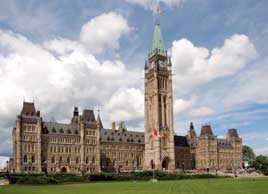Election 2011: Where the parties stand on health care
Not sure where each major party stands on health care? Consider this your cheat sheet

Source: Web exclusive, April 2011
At the start of Canada’s 2011 federal election campaign, it seemed like the economy was the only issue that mattered to Canadians. Every party commented on corporate tax cuts, job creation and economic growth, and while economic issues are important, results from a recent Nanos Research poll suggest that health care is still the most important concern for voters.
As voting day fast approaches, the federal party leaders are talking more about health care, but non-policy issues like former Conservative MP Helena Guergis‘ ouster from cabinet last year are still getting more air time. To help fill you in on the issues surrounding health care, we’ve put together a primer on where each major national party stands.
Conservatives
In 2011, the 2004 Health Accord, a Liberal initiative that gave the provinces $41 billion over 10 years in healthcare funding, will need to be renegotiated. As part of the accord, the feds currently give provinces a six percent increase in funding every year. The Conservatives have said that they will maintain that increase until a new deal is reached. They’ve also committed to renewing the accord, thought it’s unclear what a new deal will look like.
The party’s platform does point out that when it comes to healthcare policy, it’s ultimately up to the provinces to figure out what’s best for Canadians. ‘In the spirit of open federalism, when renewing the Health Accord, we will respect the fact that health care is an area of provincial jurisdiction and respect limits on the federal spending power,’ the party writes.
The Conservatives haven’t said much more about health care in this election, though they have offered some fitness-related tax breaks to help encourage healthy living. In 2007, the government introduced the Children’s Fitness Tax Credit, to cover some kids’ athletic programs. The Conservatives have promised to double the value of that credit, from $500 to $1000 per year.
They’ve also said they’ll introduce an Adult Fitness Tax Credit to cover up to $500 a year in exercise-related fees.
A Family Caregiver Tax Credit has also been promised. That will give people caring for infirm family members a tax credit of $2,000 a year.
Liberals
Like the Conservatives, the Liberals have pledged to renegotiate the Health Accord and continue paying the six percent annual increase until a new deal is reached. But Liberal leader Michael Ignatieff has also promised to hold a first ministers conference on health within his first 60 days as prime minister. ‘We need to start the discussions about how to save and reform our health care system not in 2014, but in 2011,” he recently told reporters at a campaign stop.
Home care is a big issue for the Liberals. They’ve introduced a $1 billion plan to help people care for infirm family members, which includes six months of compassionate leave, and a yearly $1,350 tax benefit to help people deal with the costs of taking care of a sick relative.
The party has also said it will forgive up to $40,000 in student-loan debt for doctors who work in rural areas and up to $20,000 for nurses.
Here are some other healthcare initiatives the Liberals plan to enact if they win the election:
‘ $100 million over the first two years in power for neurological-related research
‘ Explore ways to lower the cost of prescription drugs
‘ Pledge $40 million over four years to help children in low-income families access healthy foods
‘ Develop a ‘Canadian Health Promotion Strategy’
NDP
Like the other parties, the NDP will continue the six-percent healthcare payment increases until a new accord is reached. The party has also restated that it is committed to a single-payer, universal healthcare system and says it will negotiate a new 10-year plan
A central part of the NDP platform is their commitment to hiring more doctors and nurses. The party says it will train 1,200 new doctors over the next decade and will add 6,000 new spaces for nurses over the next six years.
They also want to move seniors from hospitals into long-term home-care treatment facilities, provide access to home care for an additional 100,000 families and insure home care and long-term care under the Canada Health Act. The NDP say their home-care plans will cost $537 million.
The NDP also plan to:
‘ Reduce prescription medicine costs
‘ Implement a ‘Children’s Nutrition Initiative’ to help provide healthy meals to students
‘ Look at ways to reduce serious sporting injuries
Green
The Green party hasn’t said much about the health care accord, other than stating that they will maintain universal healthcare. Their big plan is to create a national pharmacare program to bring down the costs of prescription drugs. Party leader Elizabeth May says she’ll create a ‘federal crown corporation to negotiate directly with the pharmaceutical industry to bring down the price per unit of pharmaceutical drugs.’ If the federal government is the one buying drugs in bulk, she says, prices will fall.
May has also said that she wants to address mental health and focus on helping youth with addictions. ‘We have far too many young people that can’t get age-specific assistance if they are dealing with addiction,’ she said in a Globe and Mail Q&A. ‘The facilities simply aren’t there to help those kids.’
Don’t miss out! Sign up for our free weekly newsletters and get nutritious recipes, healthy weight-loss tips, easy ways to stay in shape and all the health news you need, delivered straight to your inbox.




